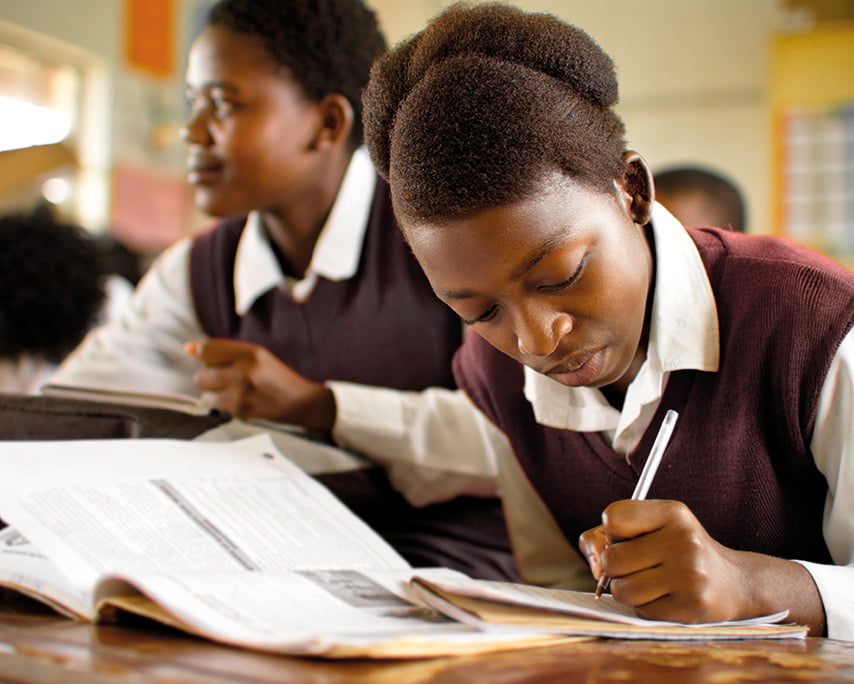South African girls working together in a class room in the Transkei region of rural South Africa.
Photo Credit: Epicurean/Getty Images
Climate change education for the younger generation
Teaching climate change to the younger generation needs to be more than educating them on scientific concepts. We need to teach them about climate change and the long-term changes in the Earth’s climate, including changes in temperature, rainfall, and weather patterns. Educate them on how human activities such as burning fossil fuels, deforestation, and industrial processes are the primary drivers of changes in the climate. Additionally, we must equip them with the knowledge and skills they need to understand the complexities of this global issue and how to take action to address it. Teaching climate change to the youth should empower them to become informed and engaged global citizens.
The importance of information and knowledge as critical drivers of social change and development, especially for the youth, cannot be overstated. In today’s interconnected world, access to information and knowledge is essential for individuals, communities and societies to thrive. Further, quality information and expertise are critical for promoting environmental sustainability. By raising awareness of environmental issues and providing information about sustainable practices, the youth, individuals and communities can take action to protect the environment and mitigate the impacts of climate change.
Teaching climate change to the younger generation is not just important, it is urgent. They are the ones who will be most affected by its impacts, and these effects are already disrupting ecosystems, weather patterns, and communities worldwide. The severity of these disruptions will only increase in the coming decades. By educating young people about climate change, we are not only preparing them to adapt to these changes but also empowering them to mitigate their impact on future generations.
Teaching the youth about climate change is not just about instilling a sense of responsibility and stewardship for the environment. It’s about empowering them to make a difference. As they understand the impacts of climate change and how it is being addressed, they are inspired to take action in their own lives and communities. Their understanding of the causes and effects of climate change makes them more likely to make sustainable choices and advocate for policies that promote environmental conservation and sustainability. By recording climate change, they are not just becoming environmental advocates and leaders, they are shaping the future of climate change.
Teaching climate change to the youth is not just about educating them. It’s about inspiring them to become the next generation of climate change experts and innovators. By fostering an interest in Science, Technology, Engineering, and Mathematics (STEM) fields related to climate change research and mitigation, we are cultivating their potential to make significant contributions in the future.
One way to teach the younger generation about climate change is to generate publications and resources they can refer to and even build upon. It is vital to provide educational resources, such as books, articles and websites, that explain the science behind climate change in an accessible way. These resources should allow them to learn about the causes and effects of climate change. Have the publications capture images and videos that illustrate the impact of climate change, such as melting glaciers, changing landscapes, or extreme weather events. The visuals should be a great way to assist young people in understanding the impact of climate change on the environment.
Another great way to have the youth involved in solving the climate crisis is by encouraging them to participate in citizen science projects related to climate change, such as monitoring wildlife or tracking weather patterns. The idea is to have them contribute to scientific research and understand the importance of data collection. Engage them in hands-on activities that demonstrate the principles of climate change, such as building a greenhouse effect model or conducting experiments to understand the carbon cycle. Additionally, have them express their thoughts and feelings about climate change through art and music. This can be a powerful way to engage them in the issue and inspire action.
Addressing climate change requires concerted efforts from each of us, including the youth. It is essential to include the young generation in understanding and finding solutions to greenhouse gas emissions, how to transition to renewable energy sources, protect and restore our ecosystems, and adapt to the changes already occurring. Educating them now is about preparing them to adapt to these changes and mitigate their impact on future generations.



